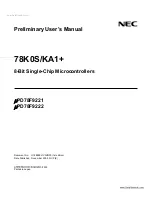Chapter 14 Serial Peripheral Interface (SPIV3) Block Description
Freescale Semiconductor
MC9S12C-Family / MC9S12GC-Family
431
Rev 01.24
The direction of each serial I/O pin depends on the BIDIROE bit. If the pin is configured as an output,
serial data from the shift register is driven out on the pin. The same pin is also the serial input to the shift
register.
The SCK is output for the master mode and input for the slave mode.
The SS is the input or output for the master mode, and it is always the input for the slave mode.
The bidirectional mode does not affect SCK and SS functions.
NOTE
In bidirectional master mode, with mode fault enabled, both data pins MISO
and MOSI can be occupied by the SPI, though MOSI is normally used for
transmissions in bidirectional mode and MISO is not used by the SPI. If a
mode fault occurs, the SPI is automatically switched to slave mode, in this
case MISO becomes occupied by the SPI and MOSI is not used. This has to
be considered, if the MISO pin is used for other purpose.
14.4.6
Error Conditions
The SPI has one error condition:
•
Mode fault error
14.4.6.1
Mode Fault Error
If the SS input becomes low while the SPI is configured as a master, it indicates a system error where more
than one master may be trying to drive the MOSI and SCK lines simultaneously. This condition is not
permitted in normal operation, the MODF bit in the SPI Status Register is set automatically provided the
MODFEN bit is set.
In the special case where the SPI is in master mode and MODFEN bit is cleared, the SS pin is not used by
the SPI. In this special case, the mode fault error function is inhibited and MODF remains cleared. In case
the SPI system is configured as a slave, the SS pin is a dedicated input pin. Mode fault error doesn’t occur
in slave mode.
If a mode fault error occurs the SPI is switched to slave mode, with the exception that the slave output
buffer is disabled. So SCK, MISO and MOSI pins are forced to be high impedance inputs to avoid any
possibility of conflict with another output driver. A transmission in progress is aborted and the SPI is
forced into idle state.
If the mode fault error occurs in the bidirectional mode for a SPI system configured in master mode, output
enable of the MOMI (MOSI in bidirectional mode) is cleared if it was set. No mode fault error occurs in
the bidirectional mode for SPI system configured in slave mode.
The mode fault flag is cleared automatically by a read of the SPI Status Register (with MODF set) followed
by a write to SPI Control Register 1. If the mode fault flag is cleared, the SPI becomes a normal master or
slave again.
Summary of Contents for MC9S12C Family
Page 689: ......

















